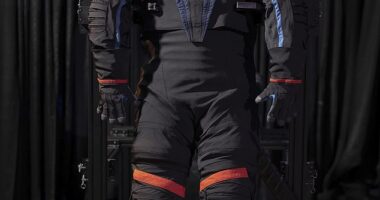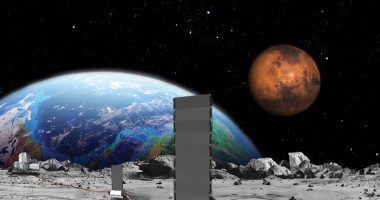

The recent HBO series Years and Years, created by former Doctor Who showrunner Russell T. Davies, was excellent, but flew under the radar for many sci-fi fans. Science fiction editor John Joseph Adams says he didn’t even hear about it until it started showing up on lists of the best TV shows of 2019.
“I just completely missed it somehow,” Adams says in Episode 402 of the Geek’s Guide to the Galaxy podcast. “The way they marketed it just somehow eluded me, and I didn’t hear anybody talking about it on Twitter, which is how I tend to gauge whether or not I need to invest my time in a show.”
The series follows an ordinary British family, the Lyons, over two decades as their lives are upended by politics and technology. Science fiction professor Lisa Yaszek likes that the show focuses on a large, diverse family.
“When you have big issues, one of the ways you make them manageable is to explore them through the microcosm of a family,” she says. “It’s a great way to reach not just science fiction people, but people outside the genre, who always think that it’s about ‘dashing young singles going off into outer space to fight bug-eyed monsters.’ This reminds us that science fiction is a big tent, and that there are lots of ways to engage these big issues.”
Science fiction author Tobias S. Buckell says the plight of the Lyons family will make it easier for many people to sympathize with the struggles of the working class. “For me the show wasn’t even so much about dystopia,” he says. “It’s about a white collar family—as a result of automation and poor political choices—being shoved into the kind of world that blue collar people are dealing with right now.”
Geek’s Guide to the Galaxy host David Barr Kirtley felt the show went off the rails a bit toward the end, but overall he was impressed by the show’s characters, who seem remarkably real even as they stand in for larger issues.
“Particularly the first four episodes I would consider must-watch for any science fiction fan, and particularly any science fiction writer, in terms of an example of how to have well-drawn characters—very human-seeming characters—in a science fictional world,” he says. “I think this is just a remarkable model of that that everyone should try to emulate.”
Listen to the complete interview with John Joseph Adams, Lisa Yaszek, and Tobias S. Buckell in Episode 402 of Geek’s Guide to the Galaxy (above). And check out some highlights from the discussion below.
Tobias S. Buckell on the future:
“[The parents] would have been progressive by our standards, but then they couldn’t go that much further with their daughter, because they’re like, ‘This is too far.’ This is a mixed-race couple, and they’re talking about how they’re going to be warm and welcoming of her because they think she’s [transgender], but then when she explains that she’s transhuman they’re really upset. When she says that she doesn’t want to be a living thing, that she wants to be uploaded into a machine, and that her goal is basically—as far as they can tell—to [commit] suicide, they struggle with it. … Science fiction can do this. It creates that discomfiture of saying, ‘One day you too will be an old person who doesn’t get the kids.’ And that was an interesting experience to have while watching it, to think about that.”
Lisa Yaszek on science fiction vs. dystopian fiction:
“Part of what I liked about it is it’s as much science fiction as dystopian fiction. I mean, their world is kind of a crappy world, but the world we live in now is kind of a crappy world. I think what I liked about the show is there are also these elements where things change, and some things get a little bit better. It seemed like they cracked the artificial food problem. I realize it comes at the cost of people’s jobs, of course, but to be able to feed people is a pretty big deal. And there are some medical developments. I think it’s kind of interesting that it’s not entirely like The Handmaid’s Tale, it’s not the whole world completely winding down and going backwards. It’s like life—dynamic.”
David Barr Kirtley on nuclear bombs in science fiction:
“The first episode ends with the United States dropping a nuclear bomb on this disputed island—an artificial island that China has built. The characters all think it’s the end of the world and freak out, but then the next episode starts and life—for them—has pretty much gone back to normal. And Edith, who’s this ‘Greenpeace activist’ type, makes this point that after Hiroshima, most people in the West just went back to their normal lives. These things happen that seem like the end of the world—and are the end of the world for lots and lots of people—but then elsewhere in the world life just goes on pretty much as normal. I’ve never seen that in a science fiction show. I was expecting it to be Mad Max starting in Episode 2.”
John Joseph Adams on The Millennial Project:
“I really loved the Hong Sha Dao artificial island storyline, because that’s something I read about years and years ago. Before I even knew anything about science fiction, I read this book called The Millennial Project, which was basically a science fiction nonfiction book teaching you how to build a science fictional future. It was a book that science fiction writers could read and be like, ‘Oh hey, I could write a million different short stories out of all these different things in here.’ One of the ideas in there was this idea of constructing artificial islands, and it just blew my baby little science fiction reader mind, and I’ve hardly ever seen anyone incorporate that into science fiction. So I thought it was really cool to see it in a near future context in this show.”







